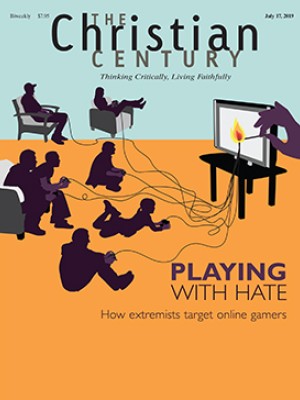July 28, Ordinary 17C (Luke 11:1–13)
What if, when praying for our daily bread, we had real food in mind?
What if the surface of the Gospels were smooth as glass, their themes unified, outlines evident, and imagery integrated? What if they didn’t jump around like a ride on a rough road and show light through the cracks? What if a single tone of serious religiosity pervaded the whole and expected from its readers a uniform response of equanimous acceptance? What would be the fun of that? Where would be the challenge? Instead we are provoked by the questions in the text and others unexpressed.
This week’s passage from Luke slides from piety to pratfall, from rhythmic reassurance to absurd exaggeration, and lands with a not totally convincing summary about the Holy Spirit. The raggedness of the Gospel surface invites readers to discover the logic between the parts and to try to make sense of the whole.
Read our latest issue or browse back issues.
Critical Gospel studies would explain that this highly valued tradition about the prayer that Jesus taught was preserved in a written source shared by Matthew and Luke. One version, likely earlier than the one found in Matthew, was placed by the writer of Luke into what François Bovon calls an “artificial but plausible” narrative context. The evangelist follows it with a humorous parable linked to the prayer by the themes of asking, giving, and bread. A series of sapiential sayings follows, using the keywords knock and ask. Then a rhetorical question makes an implied comparison between human parents and God. Luke draws the sequence together with a saying about the Holy Spirit, a central motif in the Gospel of Luke. Another way to account for the sequence is that it reflects Jesus’ own logic and rhetorical strategy as he moves from one topic to another.
Let’s let the bumps, cracks, and seams invite us toward imagining the disciples’ questions about the risk of prayer. Luke presents what we know now as the beloved Lord’s Prayer as an answer to the disciples’ request for instruction. The prayer that Jesus teaches them is not the familiar one from the liturgy, prayed in an infinite number of settings for centuries. It is a spare, abridged version, without the flourishes that make a demand sound like a polite request. Unadorned address: “Father.” Eschatological pronouncement: “Your kingdom come.” Three petitions: give bread every day; forgive our sins as we forgive; don’t bring us to the time of trial. Today it would be like an email with no exclamation points or personalization.
What if we—so accustomed to polished, careful, self-protective address to God—prayed in this bold, no-frills style? What if the bread we asked for was real food that we got hungry for again every single day? What kind of relationship with what kind of God would that require?
Perhaps the parable is Jesus’ response to unspoken questions the disciples have about this bold prayer: Lord, who are we to ask God for bread every day? Or to be forgiven? Or to be kept out of danger? What if we are afraid God won’t give us all this that we want? A reader might fill in this crack. Jesus says, To your fear of God’s denial or absence, I offer this comic drama of inconvenience and conflicting obligations.
Each friend in the chain makes a claim on the other, the friend who’s just arrived and expects a meal and the friend of his who wakes up his other friend in the middle of the night. The parable quotes the answer from the superior friend, “no.” Other gospel no’s resemble this one: the refusal by the judge of the widow’s demands for justice (Luke 18:1–8), Jesus’ answer to the Syrophoenician woman (Mark 7:24–30), his “not now” to his mother at the wedding (John 2:4). But this no is not easily spiritualized. It’s funny. It’s selfish. It’s the middle of the night, after all.
Before we can fully absorb the emotional reality of God’s no, Jesus reverses the outcome with an ambiguous explanation. It is not affection that causes the disgruntled friend to relent but “shamelessness.” Whether it is the shamelessness of the petitioner or the fear of shame of the petitioned is not clear. In any case, shamelessness is not a typical virtue for the one who prays.
If this scenario could be simply translated, if it were crystal clear, it would not be a parable. Give us daily bread as we give others’ to them. Wake us up like you would wake up your friend. Give us today our daily bread even if it’s midnight. Even if we don’t know why it eventually works, keep at it anyway.
But wait! Who’s who in the parable? We hear the eloquent no from the grumpy friend more clearly than the suggestion that he will eventually respond. The disciples ask—we ask—are you sure?
Jesus’ next words bear the comforting rhythm of proverbial counsel. Knocking recalls the locked door of the parable. Seeking is a new metaphor, perhaps from a wisdom source. Unspoken questions in the empty interval: That sounds too good to be true—really? Will we get, find, and enter the place we desire? Jesus offers absurdity, surprise, and horror. Give a child wiggling, stinging, dangerous creatures instead of bread? I don’t think so!
Your heavenly Father is a better parent than you are, and he will “give the Holy Spirit to those who ask him.” To be content with this punch line is to have missed the insights along the bumpy road. The persistent questions reflect struggle with prayer. The responses are uneven attempts to approach its mystery. It’s about keeping at it, trusting, and not being too polite.





